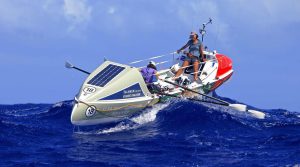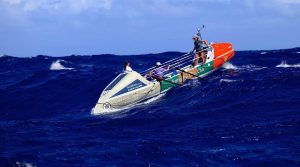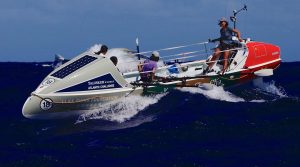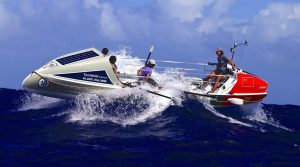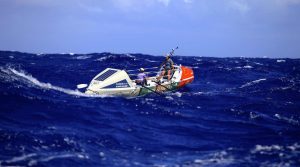At 8:13am on January 18 (HK time), Kung Fu Cha Cha, the Mainland China entry in the Talisker Whisky Atlantic Challenge 2017, comprising four Shantou University female students—Cloris Chen Yuli, Amber Li Xiaobing, and Tina Liang Mintian from Guangdong and Sarah Meng Yajie from Henan, became the first team ever from China to complete the grueling cross-Atlantic race. In conquering the “world’s toughest ocean rowing challenge” across 3,000 miles (approximately 5,000 km), they set the following world records:
- 1. First team from China to row across the Atlantic Ocean.
- 2. First team from Asia to row across the Atlantic Ocean.
- 3. With an average age of 23.5, they became the youngest team ever to row across the Atlantic.
- 4. Their time of 34 days, 13 hours, 13 minutes shattered the previous record of 40 days, 8 hours, 26 minutes set two years ago. The women are now the fastest team to have ever accomplished the challenge as a four-woman crew.
Their Story
When they entered Shantou University, the four women never imagined they would have the opportunity and the courage to participate in such a physically strenuous cross-ocean rowing event. Prior to their departure, their parents could barely hold back their tears, worried that their daughters would have to endure extreme climates, life-threatening conditions, and extraordinary hardships. The team members supported each other and embraced this enormous challenge with a clear goal in mind, charging ahead from the start with great confidence and determination.
In the open ocean, things rarely go as planned. On just the eighth day of the journey, they sailed into a raging storm that whipped up 45mph high winds and massive 20-foot waves for several days. In the latter part of the journey, there were two 7.8 magnitude earthquakes and Tsunami warnings issued in the area. The team overcame every obstacle, demonstrating confidence in their ability and decision-making. The Kung Fu Cha Cha team said they became more excited as they came within 12 hours of their destination, knowing that they could soon “enjoy a coke and some fried chicken.”
Li Ka-shing: Empowering the next generation to conquer a global stage
Shantou University is a pioneer for education reforms in Mainland China, encouraging students to build a strong body and full heart. Physical fitness is part and parcel of the curriculum, rather than an extra-curricular activity. In recent years, the University began offering extreme physical conditioning programs as an alternative education method. The innovative programs are open to all students who must pass stringent physical assessments. Two years ago, 20 students were selected from over 400 candidates to form ocean rowing teams to participate in a historic 8-day row from Shantou to Hong Kong, which also included science students and journalism students.
An avid rower himself in younger days, Mr Li is particularly vested in Kung Fu Cha Cha’s epic row and monitored the team’s progress daily via the race’s tracking application. During his satellite call with the team, Mr. Li expressed his admiration for their courage and determination. He believes that “In addition to the creation and dissemination of knowledge, institutions should also provide different opportunities for students to apply real life skills on a greater world stage. All educators should be contemplating how best they can achieve this goal.”
FAQ:
Q: What was it like living on a boat sailing across the Atlantic?
A: Everything was done on the boat. They ate only the food they carried on board, and drank only water treated with solar powered desalinaters. They took turns every two hours with rowing and resting. It is an enormous physical and mental challenge.
Q: How did they conquer their fear on the seas?
A: They all had their minds set on a single goal, and they supported and encouraged each other throughout the journey.
Q: What was the most difficult part of their preparation?
A: They went through strenuous training every day. However, they were keenly aware of the significance of being the first Chinese team to take part in the TWAC, and they took it upon themselves to ensure that they were in the best possible position to succeed.
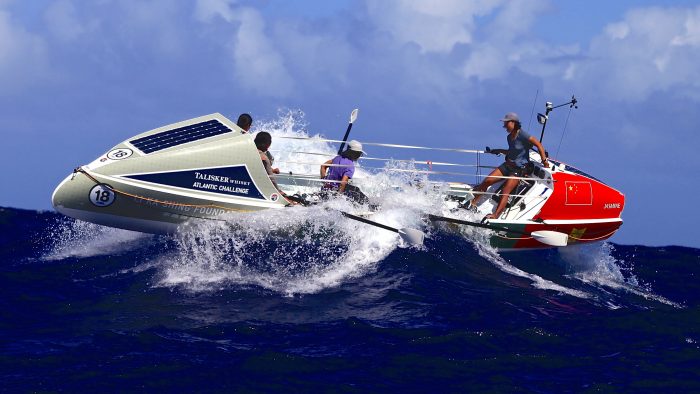
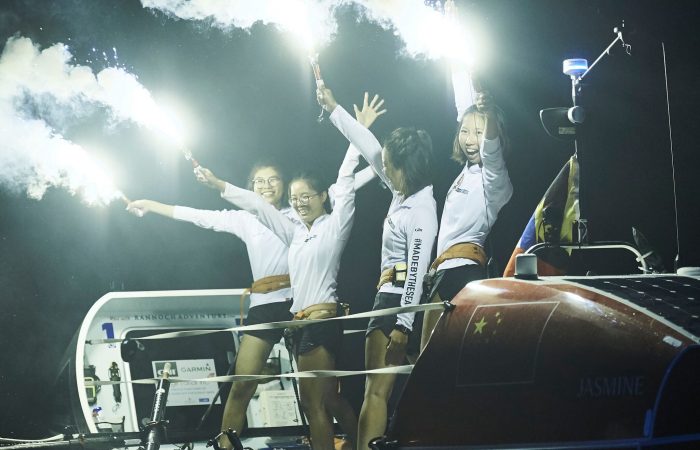
Kung Fu Cha Cha, comprising four Shantou University students, completes the Talisker Whisky Atlantic Challenge in 34 days, 13 hours, 13 minutes, breaking the previous women’s record set two years ago.

Kung Fu Cha Cha is the first team from China to row across the Atlantic Ocean.
(Photo Credit: Ben Duffy/Talisker Whisky Atlantic Challenge)
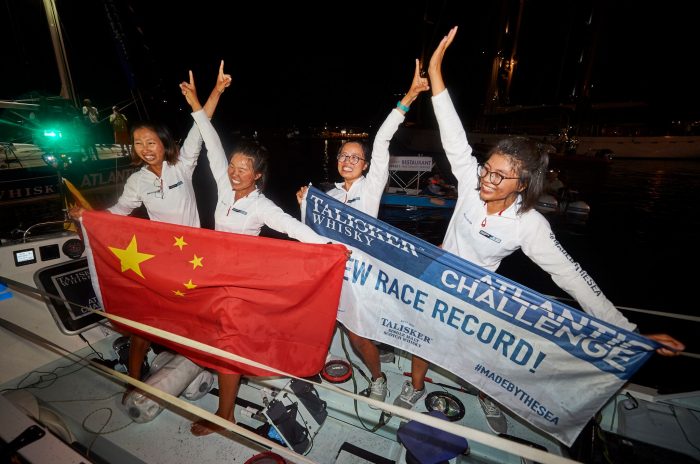
With an average age of 23.5, Amber Li Xiaobing, Sarah Meng Yajie, Cloris Chen Yuli, and Tina Liang Mintian (from left to right) become the youngest team ever to cross the Atlantic.
(Photo Credit: Ben Duffy/Talisker Whisky Atlantic Challenge)
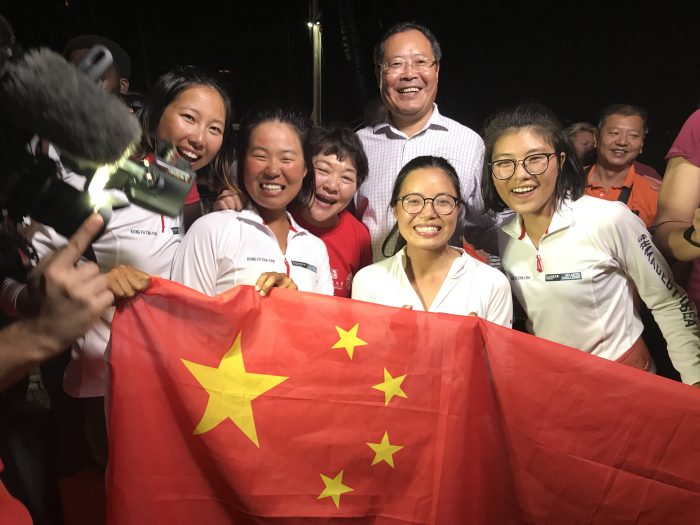
H.E. Wang Xianmin, Ambassador of the People’s Republic of China to Antigua and Barbuda, greets the Kung Fu Cha Cha team.
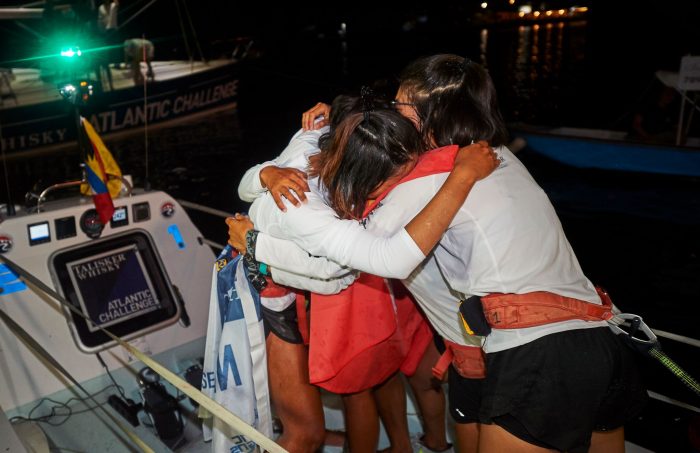
An emotional moment for the team after rowing some 3,000 miles and setting four world records.
(Photo Credit: Ben Duffy/Talisker Whisky Atlantic Challenge)
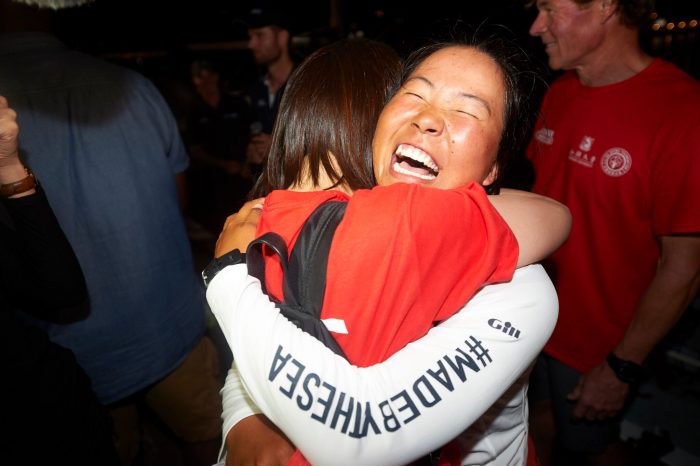
Team member Sarah Meng Yajie celebrates the moment.
(Photo Credit: Ben Duffy/Talisker Whisky Atlantic Challenge)
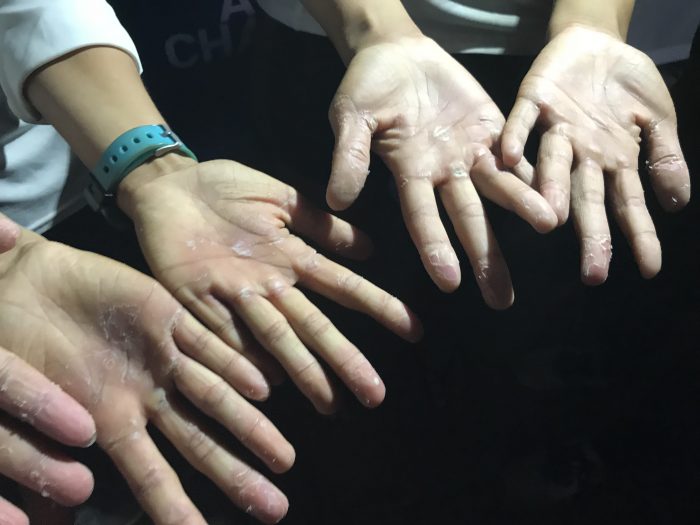
The four pairs of hands bearing the marks of 34 days at sea.
About the Talisker Whisky Atlantic Challenge
Described as the “world’s toughest row”, the Talisker Whisky Atlantic Challenge is the premier cross-ocean race that stretches 3,000 miles (about 5,000 km) west across the Atlantic from La Gomera in Spain to Antigua in Central America. 25 teams from all over the globe took part in the 2017 TWAC which began on December 14. TWAC was founded by Sir Chay Blyth as a race that would enable participants to challenge themselves, raise funds for charities and build friendships across the seas.
About the Li Ka Shing Foundation
Established in 1980, the Li Ka Shing Foundation (LKSF) has invested over HK$20 billion to work on education, medical services and research initiatives globally. In 2006, Mr. Li described his philanthropic effort as akin to having another son in the family. He called for a paradigm shift in our Asian culture of giving, through apportioning more of our wealth and means towards social capital so that we could bring forth great hope and promises for the future.

